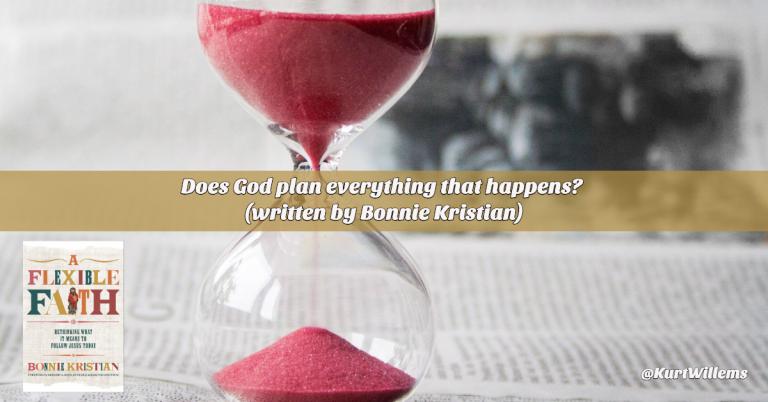
A couple of weeks ago, I introduced you to my friend Bonnie Kristian. She is the author of A Flexible Faith: Rethinking What It Means to Follow Jesus Today.
Her guest post (“What happens to people who never hear about Jesus?”) was so well received that I asked if she’d be up to sharing with us once more. Today, we get another excerpt from her book, which… by the way… just released: THIS WEEK! This is a book that I highly recommend.
As a resourcer, I can’t tell you how excited I am about this particular book that deals with almost every major theological issue that Christians disagree about. And we need to get better at disagreeing with grace. This book helps frame the issues to facilitate intelligent and humanizing conversations. Read it with a friend or small group!
<<<Thanks to all my Patreon supporters. You are making a huge difference! We are up to 49 supporters! My goal is to break 100 in the upcoming months. Will you help make that happen? For $3 or more, you can help enable me to do what I love: resource you through writing and podcasting!>>>
Here’s the excerpt!
Does God plan everything that happens? (written by Bonnie Kristian)
This question is about two separate but closely related topics: Our first concern is with divine providence, which is God’s control over the universe and the course of history. Our second concern is with divine foreknowledge, which is what God knows about future events (and how he knows it).
What we think about these topics is enormously influential for what we believe God is like, what kind of world he created, and how our lives function in that world. In practice, I find that talking about providence and foreknowledge tends to raise the same two issues for many people. The first is about evil: Does God make bad things happen? Is he responsible for the horrors of history? The second is about salvation: Does God choose in advance who gets to be saved? Does he predestine some people to be condemned?
Though we could easily devote an entire chapter (or book!) to each of these questions, I’ve decided to address them together because they’re so interrelated. Christians believe God is omnipotent—that means all-powerful. And omniscient—that means all-knowing. But where we disagree is in how he chooses to exercise his power, how much of the future is a settled thing for him to know, and why he knows the settled parts of the future.
If this all seems obscure and needlessly complicated, don’t worry: It will soon be (at least a little) clearer. We’ll cover four options—Calvinism, Molinism, Arminianism, and the open view of the future—including how each one answers our questions about evil and salvation.
Calvinism
This first option is named for John Calvin, a colossus of the Protestant Reformation, but Calvin doesn’t get all the credit. While unquestionably a theological innovator, Calvin built on the work of earlier thinkers, especially Augustine of Hippo. Because of those other theologians, some church traditions that don’t stem from Calvin himself hold similar perspectives without calling them Calvinism, though that’s the name we’ll use here.
For Calvinists, to say God is in control of everything means he sovereignly determines everything that happens. All of history is God’s unchangeable choice, planned according to his will to display his glory. That’s why God can fully know the future, from big stuff like what happens at the end of the world to little stuff like what letter I’ll hit next on my keyboard: God knows it because he decreed it. We can trust nothing surprises God, and nothing happens to us outside his will. God’s plan can’t be stopped.
When Calvinism says God determines everything, it means literally everything, including things we see as evil. God ordains evil things for his ultimate good purpose, but he is not morally responsible for evil. Responsibility instead rests on those who actually do the evil actions. Nevertheless, because nothing can happen outside God’s will, in this view even great evils like the Holocaust or 9/11 happen at God’s direction and for his ultimate glory. How such events bring God glory may be mysterious to us now, but that doesn’t change the fact that they do.
On an individual level, Calvinism says God chooses in advance who is saved. Whether any person is a Christian doesn’t depend on their choice. As Calvin put it, God “determined with himself whatever he wished to happen with regard to every man. All are not created on equal terms, but some are preordained to eternal life, others to eternal damnation.” This is the doctrine of predestination, which says God decides our eternal fate before we are born. In salvation, as in all our choices, however, Calvinism maintains human free will is compatible with God’s unstoppable plan: We freely choose what God has chosen for us. In this way, Calvinists argue, God is solely responsible for our salvation, but we bear the responsibility for the evil we do.
Molinism
This second approach is named for Luis de Molina, a Catholic theologian who, like Calvin, lived in the 1500s. Molina wanted to reconcile real free will with a strong understanding of God’s providence and foreknowledge, and he didn’t believe (like Calvin) that our choices can be truly free if everything happens because God plans it that way.
Molina’s solution was based on the idea that God knows everything that would happen under the right circumstances. Before he created the world, God thought about how every possible scenario would go. He knew what choice each person would make in every hypothetical situation. For example, God knew if you had to choose between a blue and a green shirt, you’d pick green—and if the choice were between green and pink, you’d take pink.
So Molinism says before creation, God knew all the possible ways history could play out, down to tiny details like your shirt. Then, he chose the best one and made it happen. When you pick the pink shirt, you’re choosing of your own free will, and yet your choice was always settled because of the type of world God made. The difference between Molinism and Calvinism is that in Molinism, God knew you’d freely choose the pink shirt if given the chance, and he made a world in which you get that chance. In Calvinism, God decided in advance you will choose pink, so you choose it.
What about more serious stuff than shirts? Well, for Molinists, God is not responsible for evil because evil choices are still free choices. God permitted evil things to happen by making this version of the world, but he never forces anyone to choose evil. The course of history is settled, but God doesn’t determine our decisions. Likewise, in Molinism salvation is settled from the moment of creation—but not because God picks and chooses. Rather, God knows who will be placed in situations where they freely accept his salvation.
Molinism is not the official view of the Catholic Church, though it is one way of understanding Catholic doctrine on these questions. “To God, all moments of time are present in their immediacy,” Catholic catechism says, so when “he establishes his eternal plan of ‘predestination,’ he includes in it each person’s free response to his grace,” giving humans “the ability to cooperate freely with his plans.”
Arminianism
Our third option is Arminianism, named for Jacobus Arminius, another sixteenth-century theologian. Like Molinism, this approach rejects the Calvinist claim that free will is compatible with God determining everything in advance—but then it goes in a very different direction.
The central argument here is that God knows everything that will happen, but he limits his control over our world. It’s important to understand this distinction is about what God does, not what he’s able to do. For Arminians, God is all-powerful and all-knowing. This view is not describing a weaker or stupider God than the options we covered above.
Arminianism says God could determine everything if he wanted to—and he does predestine some things, like his final triumph over evil. But there’s a lot more he doesn’t plan so that our free will has room to operate. God opts for influence over coercion, because God values love. He wants us to freely choose whether to love and follow him. God knows everything that will happen in our future, but aside from some big parts of his plan for humanity (like that final victory), he doesn’t make it happen.
On the question of evil, Arminians have an easier time than Calvinists or Molinists. In this view, some things happen that are not in God’s will. That’s because God allows his good will to be thwarted by our free choices—it’s a risk, yes, but a necessary risk. Real love requires real freedom, and real freedom must include the possibility of making the wrong choice. God never wants evil to happen and always seeks to lead us away from bad choices, but he never forces us to choose love.
This freedom applies to salvation, too. Where Calvinism says salvation is only for those God predestines, Arminianism says God wants everyone to be saved. He makes salvation available to all of us, and he doesn’t pick who accepts it. This is not to suggest we save ourselves; on the contrary, only through God’s grace can we respond to God in faith.
Though Arminius was a Protestant, his view is quite similar to the Orthodox Church approach, which emphasizes the unequal cooperation (or synergy) between God’s grace and human free will in salvation, affirming God’s total power and knowledge while rejecting any notion of divine coercion. As the Eastern Orthodox theologian Kallistos Ware puts it, “God wanted sons and daughters, not slaves.”
Open Future
The final perspective we’ll cover is often called open theism. I haven’t used that name because it suggests this view has a different idea of what God is like—perhaps that he is less than all-powerful and all-knowing. That is not the case. Though it has much in common with Arminianism, this fourth approach is distinct in what it says about the future, not what it says about God’s power or intelligence.
Where the other three options all hold that the future is settled (while differing on why that’s so), this view says the future is partly settled but also partly open. The settled parts are things God has determined will happen, like his final victory over evil. We don’t have to wonder if that will come true, because God settled it.
But the category of settled things is much smaller than the category of things that are genuinely open to multiple possibilities. In this bigger category, God has perfect knowledge of everything that could happen and is likely to happen, but he doesn’t know what will happen, because that part of the future doesn’t exist to be known.
The crux of the issue is how God relates to time. In the other three views, God is somehow outside of time. All of history is like a big photo, and God can zoom in on different moments. In the open view, God doesn’t experience time the same way we do, of course, and his nature doesn’t change over time—but God does move through time with us. This approach says the future is like “a line that is not yet drawn,” as C. S. Lewis put it. God is with us as human and divine choices together draw the line of history.
The open view’s answers to our questions about evil and salvation are close to the Arminian answers. God never makes evil things happen, and in this perspective, he is actively working, in real time, to prevent evil as much as possible without overriding our free will. In this view, we can trust when evil does occur, God does not want it. He shares our grief. Likewise, God does not determine who is saved and who is condemned, and he is always working in love to draw everyone in the world to a voluntary, saving faith.
Discussion Questions
1. What theory of God’s providence and foreknowledge is most familiar to you? Which one(s) did your Sunday school teachers tell you?
2. Which view do you find most appealing and why? Which do you find most convincing and why?
3. Is the approach you find most appealing the same as the one you find most convincing? If not, what’s the difference?
4. How do the questions about evil and salvation influence your understanding of each view? Are there other questions you want to raise when thinking about these topics? If so, what are they?
5. What does each approach communicate about what God is like? For example, does your picture of God change depending on whether he offers salvation only to people he predestines to be saved (as in Calvinism) or wants to save everyone (as in Arminianism or the open future view)?
Learn More
For a deeper look at these interrelated topics, start here. Across the Spectrum breaks these questions down into three chapters on providence, foreknowledge, and predestination, teasing out each approach’s distinct implications. Boyd and Eddy don’t cover Molinism, however, so for more on that turn to Four Views on Divine Providence. If you’re curious about the open view, which is unfamiliar to many Christians, try Boyd’s God of the Possible and Piper’s Beyond the Bounds for dueling takes—Boyd for and Piper against the approach. Finally, I recommend Sayers’s The Mind of the Maker, especially to fellow writers or anyone with an interest in the creative arts.
- Jacobus Arminius, A Declaration of the Sentiments
- Augustine, On the Predestination of the Saints
- David Basinger and Randall Basinger (editors), Predestination and
- Free Will: Four Views of Divine Sovereignty and Human Freedom
- Greg Boyd, God of the Possible: A Biblical Introduction to the Open
- View of God
- Greg Boyd and Paul Eddy, Across the Spectrum: Understanding Issues
- in Evangelical Theology
- Chad Owen Brand (editor), Perspectives on Election: Five Views
- John Calvin, Institutes of the Christian Religion
- Christopher A. Hall and John Sanders, Does God Have a Future?
- A Debate on Divine Providence
- Paul Helm, The Providence of God: Contours of Christian Theology
- John Chrysostom, Homilies on Romans
- Dennis W. Jowers (editor), Four Views on Divine Providence
- Jessica Kelley, Lord Willing? Wrestling with God’s Role in My
- Child’s Death
- John Piper (editor), Beyond the Bounds: Open Theism and the Undermining
- of Biblical Christianity
- Dorothy L. Sayers, The Mind of the Maker
- Nancy M. Tischler, Dorothy L. Sayers: A Pilgrim Soul
This article is adapted from the book, A Flexible Faith: Rethinking What It Means to Follow Jesus Today, by Bonnie Kristian. Copyright (c) Bonnie Kristian by Faithwords. Reprinted with permission of Hachette Book Group, New York, NY. All rights reserved.
—
 Bonnie Kristian is a writer who lives in the Twin Cities. She is a graduate of Bethel Seminary, weekend editor at The Week, and a fellow at Defense Priorities. Bonnie is the author of A Flexible Faith: Rethinking What It Means to Follow Jesus Today, from which portions of this article are adapted. Learn more and pre-order at bonniekristian.com/book.
Bonnie Kristian is a writer who lives in the Twin Cities. She is a graduate of Bethel Seminary, weekend editor at The Week, and a fellow at Defense Priorities. Bonnie is the author of A Flexible Faith: Rethinking What It Means to Follow Jesus Today, from which portions of this article are adapted. Learn more and pre-order at bonniekristian.com/book.












